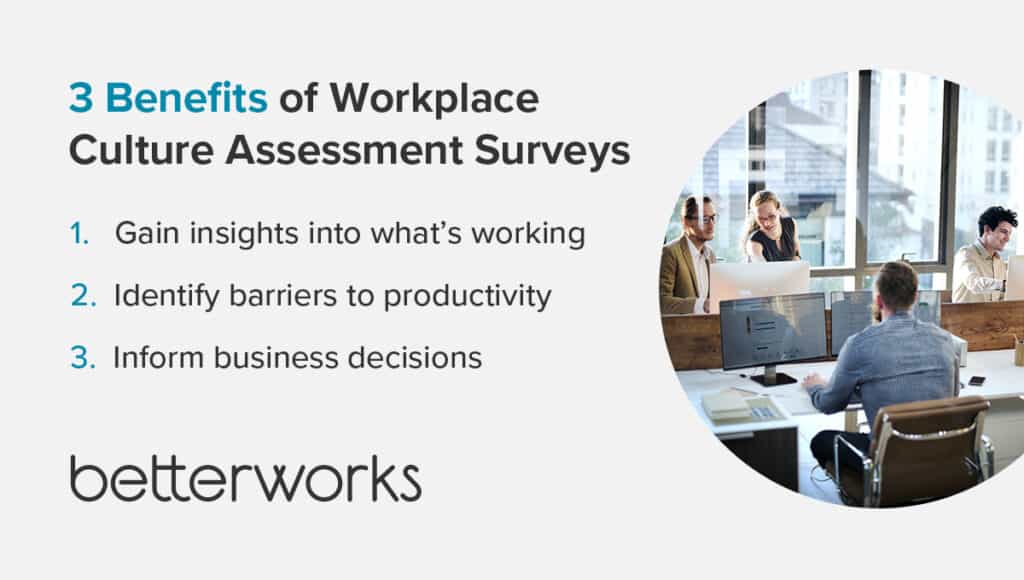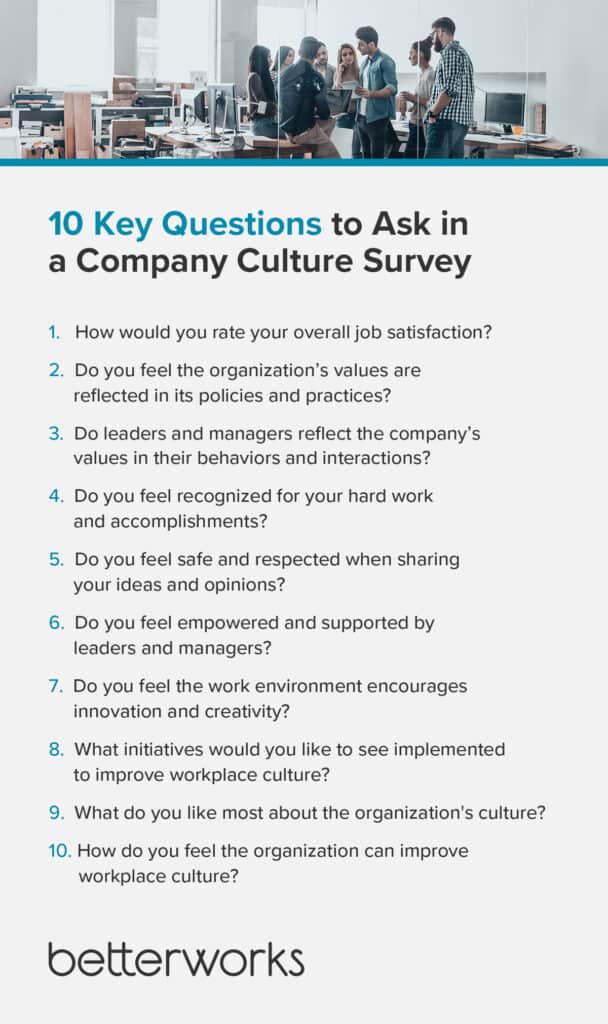- Why fostering a positive culture should be a top priority
- What is a workplace culture survey?
- 3 benefits of workplace culture assessment surveys
- 3 tips to develop an effective workplace culture survey
- 10 key questions to ask in a company culture survey
- How would you rate your overall job satisfaction?
- Do you feel the organization’s values are reflected in its policies and practices?
- Do leaders and managers reflect the company’s values in their behaviors and interactions?
- Do you feel recognized for your hard work and accomplishments?
- Do you feel safe and respected when sharing your ideas and opinions?
- Do you feel empowered and supported by leaders and managers?
- Do you feel the work environment encourages innovation and creativity?
- What initiatives would you like to see implemented to improve workplace culture?
- What do you like most about the organization’s culture?
- How do you feel the organization can improve workplace culture?
- Put company culture surveys to work inside your organization
One of the most important drivers of workforce success is also one of the most challenging to measure. More than 90% of employees responding to a recent EY survey say corporate culture affects whether they remain with an employer. But pinning down what’s great about culture and where it needs improvement is difficult. That’s why regular company culture surveys are an important part of your talent strategy.
Discover why a positive company culture matters, what you can learn from employee culture surveys, and what questions you should be asking.
Why fostering a positive culture should be a top priority
Healthy company cultures lead to healthy bottom lines.
According to Gallup research, strong organizational culture correlates with an 85% net profit increase over five years and a 50-point increase in employee engagement over three years.
That’s because a strong company culture fosters belonging, trust, and camaraderie among employees, which can lead to increased productivity and improved morale. Healthy cultures also attract and retain talented employees, as they’re more likely to stay with an employer that values their contributions and provides a positive work environment.
Externally, a healthy company culture reinforces the organization’s public image, which can influence recruitment, customer loyalty, and profits over time.
What is a workplace culture survey?
An organization’s stated culture and values don’t always line up with what employees actually experience. Much like employee engagement surveys, company culture surveys are an important tool for HR leaders who want real-time, authentic feedback about the lived employee experience.
Culture assessment surveys help you gauge your culture and whether it aligns with your values and mission. If discrepancies exist, work culture surveys will uncover them and provide a starting point for change. Look, too, to your employee engagement surveys for insights, as they have crossover with culture surveys.
How often should you conduct organizational culture surveys?
Set survey frequency based on your strategy. If you plan to conduct an in-depth survey with 20-plus questions, look to issue an annual culture survey. Otherwise you risk survey fatigue among your employees — especially if they can’t see any progress resulting from the survey.
If you’re distributing shorter pulse surveys (five or fewer questions) issue those two to four times per year. Asking the same questions at consistent intervals provides several data points to help you track trends over time. You might also combine the annual survey and pulse surveys for a more comprehensive picture of company culture. To increase participation, consider using QR codes that employees can easily scan to access the surveys.
Beyond scheduled surveys, take the temperature on culture before, during, and after major changes. If you’re merging with another company, for example, you’ll want to measure how people perceive your culture during that transition — especially as you integrate the incoming workforce.
How can you use company culture survey results?
By understanding employee feedback from surveys, HR leaders can better understand how the company culture affects day-to-day operations and where to make adjustments that improve the overall work environment.
Use survey results to create targeted initiatives, such as shoring up support for diversity and inclusion or improving interpersonal communication.
3 benefits of workplace culture assessment surveys
Workplace culture assessment surveys are an invaluable tool for gaining insight into employees’ experiences at work. Here are three ways company culture surveys empower HR leaders to create a positive and productive work environment.
Gain insights into what’s working
Survey responses highlight what people like about your culture so you know to continue those efforts. Surveys also help evaluate past initiatives and inform your planning for upcoming culture or engagement activities.
If you’re trying to get a sense of how your culture stacks up against other companies, ask employees questions that compare your culture against other places they’ve worked. This will help you understand what makes your culture unique and how you can turn that into a competitive advantage.
Identify barriers to productivity
By asking your workforce survey questions about their daily work environment, you can identify issues that may be hindering productivity, such as lack of communication or inadequate resources.
Surveys can also identify areas where additional training or education can help employees level up and increase productivity by acquiring new skills.
Inform business decisions
Collecting feedback from employees, managers, and other stakeholders helps businesses understand how their culture is perceived. This feedback informs decisions about organizational structure, policies, and behaviors.
For example, an annual survey might indicate a need to improve communication across teams or more opportunities for professional development. Analyzing these findings adds valuable, data-backed insight to HR and budget decisions that address those areas, leading to improved morale and productivity.

3 tips to develop an effective workplace culture survey
An effective workplace culture survey should gather feedback from all employees. How you design these surveys determines whether you get the honest, accurate, and complete answers you need to turn the findings into actionable strategies.
Here are three tips for producing reliable company culture surveys.
Guarantee anonymity
Employees need to feel safe giving honest answers without worrying about their job security or career potential. Without that trust, you’ll get the answers workers think you want to hear.
Assure employees that their responses are confidential and only viewed in the aggregate. Using a reputable survey partner can help employees feel more comfortable with participating and submitting complete, forthright responses.
Give people time to respond
Give employees ample time to respond to your workplace culture surveys, especially with longer surveys. You want a high participation rate, but you also want each respondent to feel like they had time to give thoughtful, honest feedback. Communicate a firm deadline for submitting survey responses, but make sure that employees have access to the survey well before then.
Avoid biased questions
Employee survey questions that are clear, concise, and unbiased will give you the best results. You want each question to address one area, be easy to read, unambiguous, and calibrated against biases. Look to an assessment partner or other qualified professional to help craft your surveys.
Avoid questions that contain loaded language or phrases that imply a certain response. It’s also important to avoid leading questions — those that contain the desired answer within them. Each of these can negatively influence employee responses, skew the results, and reduce their reliability for making decisions.

10 key questions to ask in a company culture survey
Effective company culture surveys give HR leaders valuable feedback about the workforce’s day-to-day experiences and identify areas that need improvement. These surveys are only as effective as the questions.
Here are 10 examples of employee survey questions you might use in your organizational culture assessment instrument.
How would you rate your overall job satisfaction?
Job satisfaction is a key indicator of employee engagement and morale and is suggestive of whether employees feel valued and respected. This question asks employees to rate their job satisfaction. When combined with a follow-up asking workers to explain their rating, HR can pinpoint where the employee experience is lacking or strong.
Do you feel the organization’s values are reflected in its policies and practices?
Values are foundational to fostering a healthy workplace culture. But stated values aren’t always reflected in daily behaviors. Asking employees whether they see company values reflected in daily policies and practices helps you assess what behaviors or policies are working — and what adjustments are needed.
Do leaders and managers reflect the company’s values in their behaviors and interactions?
Leaders set the tone for company culture. Use this question in your surveys to investigate whether employees feel leadership models the company’s values. Identifying disconnects provides a starting point for helping leaders and managers uphold the values they’re espousing. Investigate any discrepancies between values and behavior promptly, as the solution could lie with individual leaders or require a wider look at the organization’s behavior and practices.
Do you feel recognized for your hard work and accomplishments?
Workplaces that regularly recognize people produce happier, more engaged employees, along with improved trust and collaboration. Your employees increasingly believe that their contributions are acknowledged and appreciated.
Asking workers whether they feel recognized helps you measure employee satisfaction and engagement. Use those findings to dig deeper into the state of your culture and how engagement is affected.
Do you feel safe and respected when sharing your ideas and opinions?
How people respond to this question is a strong indicator of inclusion in the workplace. When people feel OK sharing their ideas and perspectives, you likely have a healthier culture and more productive and innovative teams. If respondents say they don’t feel psychologically safe, you have a culture problem that requires further investigation to understand the root causes.
Do you feel empowered and supported by leaders and managers?
Workers thrive when they trust that leadership supports them and that managers will help them overcome obstacles to performance. Employee responses to this question help you gauge whether employees trust leaders and managers not to micromanage or neglect them.
This question can also reveal potential shortcomings in your culture. Workers might have well-meaning managers but lack the right supports, or they might feel their manager or other leaders are actively working against them.
Do you feel the work environment encourages innovation and creativity?
Innovation and creativity are critical skills for today’s workplace, and they’re the results of a culture that embraces diversity and inclusion, the ability to speak up without fear, and an openness to new ideas.
Asking employees to share their experiences helps you determine whether the workplace culture is conducive to innovation and creativity. If the responses to this question are poor, you can look deeper into what’s preventing innovation from blooming inside your organization.
What initiatives would you like to see implemented to improve workplace culture?
Asking employees this question can help you identify areas of improvement within the company culture you may not have otherwise considered. By understanding the initiatives employees strongly agree would enrich their experience, you can tailor your strategic efforts as you build a positive workplace culture.
What do you like most about the organization’s culture?
One of the most important outcomes from a workplace culture survey is insight into what you’re doing well — and what employees see as the strengths of your culture — as well as what you need to double down on.
How do you feel the organization can improve workplace culture?
Different employees need different things from your culture. By asking people what you can do to improve your company culture, you learn what different employee populations prioritize. This question also helps identify emerging problems that, if unaddressed, may lead to dissatisfaction, disengagement, and turnover.

Put company culture surveys to work inside your organization
Company culture surveys help HR leaders create a workplace where everyone feels they belong and can thrive. They provide up-to-date feedback about how your workforce feels, what it’s happy about, and where you could do better.
A healthy company culture doesn’t happen overnight. Culture surveys help you analyze your organization and continually make progress. Betterworks Engage helps you gather continuous feedback throughout your employee life cycle via employee Net Promoter Score, diversity, equity, and inclusion, culture surveys, and more.
Delta Dental Engages and Unites Its Culturally Diverse Teams







